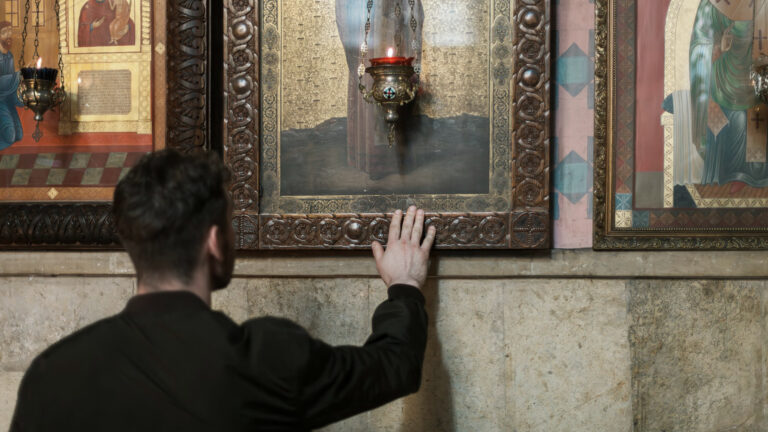Jesus cares about church unity because it’s a testimony to the world.
That’s the simple way of explaining what Jesus prayed the night before he was crucified. But reading through John 17 again recently, I was struck by the deeper logic of the passage and the desire that his followers be one. There’s something more powerful at work here than “church unity is a witness to the world.”
Getting Along in God
Jesus wants us to get along, yes, but the deeper truth is that we get along in God. Eternal life is knowing the only true God and the Son he sent to save us (John 17:3). The interplay between the Father and the Son (everything Christ has is the Father’s, and everything the Father has is the Son’s) provides the context for Jesus’s prayer that his followers “be one as [they] are one” (vv. 10–11). The unity of the church is to be tightly connected to the unity of the persons of the Trinity.
This means, in all our distinctiveness as members of Christ’s body, we reflect something of the nature of God when we’re one and when we display this oneness to the world. The divine unity of Father, Son, and Spirit, enjoyed from before the foundation of the world—the joy and happiness that overflows that union of eternal love—is what Jesus wants for his followers. He wants our joy to be completed (v. 13) and for us to be one just as he and the Father are one. We’ve been adopted into the family, united to Christ, and therefore united to God.
It’s more than just “getting along.” It’s getting along in God and as a mirror of his glory.
Participating in God’s Oneness
But there’s more. Jesus wants his followers to be one as a way of participating in the oneness of the triune God.
Listen to how he later prays: “May they all be one, as you, Father, are in me and I am in you” (v. 21). The unity of the church is bound up in the divine life of God. We’re invited into the triune life of love. “May they also be in us” may be one of the most profound and surprising things Jesus ever prays. His desire is that, together, we be in God.
Participation in the divine love of the Father and Son is the prerequisite for the world believing that Jesus has been sent by the Father (v. 21). In case it’s unclear, Jesus gets more explicit: “I have given them the glory you have given me, so that they may be one as we are one” (v. 22). And if the participation element isn’t clear enough: “I am in them and you and you are in me, so that they may be made completely one” (v. 23). Lesslie Newbigin comments,
It is a unity which not merely reflects but actually participates in the unity of God—the unity of love and obedience which binds the Son to the Father.
So, yes, Christian unity matters so the world will know we’re Christ’s followers, but there’s a deeper sense in which Christian unity shows the world what God is like. And an even deeper sense follows: Christian unity participates in the divine life of God as Three-in-One. Here’s how Cyril of Alexandria summed up the prayer:
He wishes them to be bound together tightly with an unbreakable bond of love, that they may advance to such a degree of unity that their freely chosen association might even become an image of the natural unity that is conceived to exist between the Father and the Son. That is to say, he wishes them to enjoy a unity that is inseparable and indestructible, which may not be enticed away into a dissimilarity of wills by anything at all that exists in the world or any pursuit of pleasure, but rather reserves the power of love in the unity of devotion and holiness.
In our different ministries, in our variety of gifts, in our works of service and love, we’re manifesting the same Spirit (1 Cor. 12:4–11). United to Christ, we’re filled by the Spirit as we serve one another. Our unity is one of divine love.
Enduring the World’s Hostility
Why does all this matter? Because the world is going to hate us: “The world hated them because they are not of the world, just as I am not of the world. I am not praying that you take them out of the world but that you protect them from the evil one. They are not of the world, just as I am not of the world” (John 17:14–16).
Jesus prays for his followers to stand firm, to be sanctified by the truth because God’s Word is truth (vv. 17–19). He prays for the unity of the church not merely so our “getting along” will be a testimony of God’s power but because our participation in the life of God himself will be necessary if we’re to endure the hatred and hostility of the world. Unless we participate in the divine love, unless we hold together in love, unless we’re overcome by the love of God for us expressed in our love for one another, we’ll fail the test when we experience the world’s hatred. Apart from the love of God, we’ll fall prey to the fear of man.
In the end, the goal isn’t papering over differences and finding surface-level agreement. Church unity matters because (1) our unity is connected to the unity of God himself (and thus our disunity is a scandalous affront to the gospel), (2) the world sees a reflection of God’s inner life in our fellowship when we participate in his divine love, and (3) it’s the means by which we withstand the pressures of the world that rage against God’s truth.
And so, with some of the earliest Christians, we pray,
For your holy name which you
have caused to dwell in our hearts,
And for the knowledge and faith and immortality
Which you have made known to us
Through Jesus your servant;
To you be the glory forever. . . .
Remember your church, Lord,
To deliver it from all evil
And to make it perfect in your love;
And gather it, the one that has been sanctified,
From the four winds into your kingdom,
Which you have prepared for it;
For yours is the power and the glory forever.
If you would like my future articles sent to your email, as well as a curated list of books, podcasts, and helpful links I find online, enter your address.

















